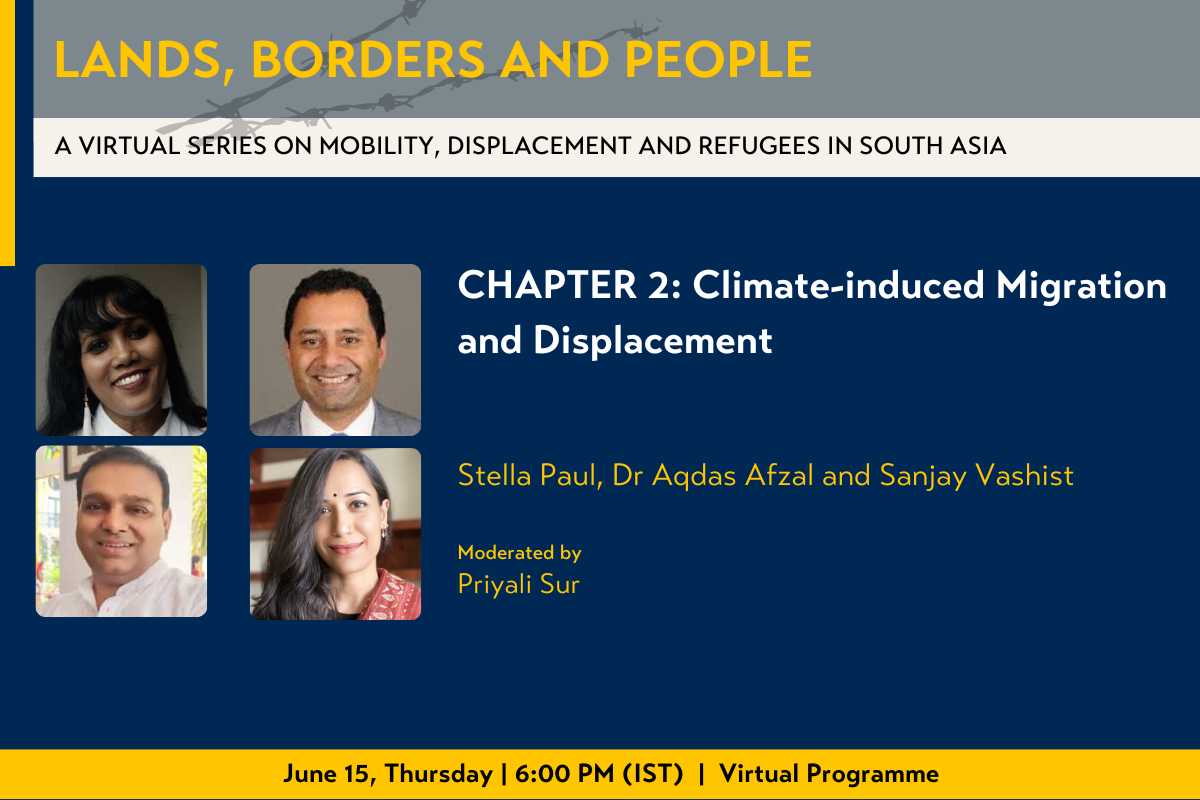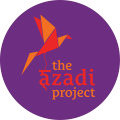Climate-Induced Migration and Displacement
VIEW EVENT DETAILSThe second in our four-part series on mobility, displacement and refugees in South Asia

In a world grappling with what economist Adam Tooze refers to as a “polycrisis,” where multiple interconnected challenges threaten global stability, climate change is a formidable challenge impacting migration patterns. Environmental degradation and climate change occurrences such as floods, high temperatures and water scarcity are increasingly driving migration worldwide. Closer home, Nomadic pastoralism in the Himalayan-Kush region, seasonal fishing in the Maldives, intensifying cyclones in Bangladesh and the disappearing islands of the Sunderbans delta are pushing people to leave their homes and even cross borders.
In cognizance of this, in 2018, the Global Compact for Safe, Orderly and Regular Migration (GCM) was established as the first United Nations agreement to guide governments in effectively managing climate migration. A World Bank report estimates that by 2050, approximately 216 million people will be compelled to migrate within their own countries due to the impacts of climate change and environmental degradation. Notably, over 50 million of these individuals are projected to be in South Asia. However, due to the absence of a universally agreed-upon definition for climate migration (are you leaving your home because of climate as the sole reason, and how does one pinpoint that factor?), these figures are only estimates. Accurately identifying individuals who are displaced specifically due to climate-related factors remains a challenging task.
Climate risk stares at over 800 million people in South Asia, making climate adaptation increasingly important: for example, making coastal cities resilient to flooding; building roads that can withstand higher temperatures; and finding salinity-resistant crops. We also need to think about migration: what are some livelihood diversification strategies or planned relocation measures? How can existing international frameworks and national policies link human mobility to climate change?
Join us as we host a panel discussion on climate-induced migration on June 15th, 2023, between 6:00 pm and 7:30 pm. Our panelists are Stella Paul, Environment and Health Project Officer, Earth Journalism Network; Dr Aqdas Afzal, Assistant Professor, Social Development and Policy, Habib University, Pakistan; and Sanjay Vashist, Director, Climate Action Network South Asia. We will delve into important topics such as climate-induced migration pathways, policy efforts at the national and international levels, and some avenues for climate action to help those vulnerable to the loss of home and livelihood. The discussion will also focus on the specific climate disasters facing India and South Asia, and how the region can approach climate-induced migration with a humanitarian lens. Can regional approaches to environmental migration in South Asia contribute to a more comprehensive and coordinated response at the international level? What are the key factors that determine whether environmental migrants are recognized as refugees or displaced persons?
***
This panel is the second installment of the four-part series Lands, Borders and People, scheduled as interactive learning modules in June and July 2023. The series aims to delve into a significant contemporary issue that impacts nations and communities globally: migration, displacement, and refugees. In each session, a panel of experts will examine various aspects of this topic, focusing on the legal, social, economic, and cultural dynamics specific to South Asia. The audience will comprise stakeholders actively involved in this sector, including human rights activists, lawyers, journalists, NGOs, and others. Priyali Sur, Founder and Director of The Azadi Project will serve as the chair and moderator for all four sessions.
The four sessions in this series are:
June 8: International Law and the Politics of Displacement
June 15: Climate
July 5: The host economy
July 19: Media and language
To register your interest in this or the remaining sessions, please email us at [email protected]. The chapters will be hosted as Zoom meeting rooms, so they require pre-registration and have limited seating. Once you write to us, we will send you a Google form with more details, and links to the session closer to the date.
We highly encourage participants to keep their cameras on for an immersive experience. Whether you have an academic, professional, or personal interest in this topic or the region, we hope you'll join us for this series.
CHAPTER 2: SPEAKERS

Stella Paul is Project Officer, Environment and Health with the Earth Journalism Network. She manages the Clean Air Catalyst and STOP Spillover projects with the Network, and serves as a mentor for their Indigenous Reporting project. She has been working as a multimedia journalist, trainer and communicator for over a decade. Stella grew up in northeastern India, where floods rendered her family homeless several times, an experience that later drove her into environmental journalism. In the past 2 years, she has reported from new locations in Africa and North America and trained a little over 100 journalists. She has won many local and international awards for her journalism, particularly her gender-sensitive environmental reporting on marginalized communities. These include the Courage in Journalism award from the International Women’s Media Foundation (IWMF) and the Global Trailblazers Award from the European Commission. In 2014, the global advocacy group Women Deliver listed her as one of the 14 Most Powerful Writers on Women and Girls Health and Rights. Stella has a post-graduate degree in Literature and a post-graduate diploma in Environmental Law.

Dr. Aqdas Afzal is an Assistant Professor of Social Development and Policy at Habib University in Pakistan. He holds a Ph.D. in Economics from the University of Missouri – Kansas City, where his research focused on the relationship between economic growth and fossil fuel energy consumption, particularly in emerging economies. With a background in political science and economics, Dr. Afzal has worked in the development sector in Pakistan and served as an adjunct faculty member at Lahore University of Management Sciences and the Government College University, Lahore. He has received notable accolades, including the Fulbright Scholarship and awards for his research contributions. His work has been published in prestigious journals, and he has presented his research at conferences in the United States.

Sanjay Vashist is the Director of Climate Action Network South Asia. He mobilizes civil society action on climate policies in South Asian countries, focusing on resilience-building and achieving a carbon-neutral future. He has successfully consolidated climate actions of NGOs, established government partnerships, and implemented an integrated approach of implementation, networking, advocacy, and training. His extensive career includes previous roles as an Advisor to Heinrich Boell Foundation, Fellow at The Energy and Resource Institute, International Coordinator for Climate Action Network International, and Natural Resource Scientist with Development Alternatives. Sanjay has authored technical papers, participated in climate impact assessments, and formulated policy recommendations in Asia and the Pacific. He holds degrees in Forestry and has 14 years of expertise in natural resource management and climate change discussions.
SERIES MODERATOR AND CHAIR

Priyali Sur is the Founder and the Executive Director of The Azadi Project. She has built and implemented programs across Europe, Africa and South Asia, helping refugees and migrants from Afghanistan, India, Iran, Iraq, Myanmar, Niger, Syria, Ukraine and Yemen. She was a former news anchor for CNN-IBN in India, and has consulted as a Social Development expert for the World Bank in Washington, D.C. Her work has been published in CNN, NPR, PBS, and The Guardian, among other international media outlets.
SERIES COLLABORATOR

Event Details
To register your interest in one or more of these sessions, please email us at [email protected].
